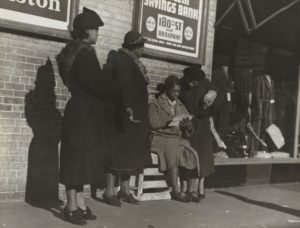“The Bronx Slave Market.” That’s what African-American journalists called it when they called the issue to public attention. A shameful period in Bronx history. During The Great Depression of the 1930’s and ending with the USA’s entry into World War Two (brief rebirth from 1947 to 1950), “Bronx Slavery” was a disgraceful fixture in the Jewish neighborhoods of the West Bronx. With unemployment disproportionately high in Harlem (and other African-American enclaves), African-American women would line up on Bronx street corners to be hired by Jewish women for a day’s housework. Top pay was 75 cents an hour (went down to a low of ten cents an hour). Many of the workers were viciously exploited and cheated. Marvel Cooke, an African-American journalist, went undercover to line up with the day workers in 1935 and wrote a fiery article about it in the magazine, “Crisis.” Harlem photographer Robert H. McNeill photographed the Bronx “slaves” as they waited for a job on a bitingly cold day. There were many outcries about the injustice from left-wing whites and African-American activists. But, the “slavery” continued. In 1939, ten-year-old HG was old enough to hate the “slavery” and tried, to no avail, to arouse HG’s friends and classmates to action. That year, there were five in HG’s family living at home: HG, Mother and Father; late sister Beulah Naomi (working during the day and attending CCNY at night); late elder brother Bernard (studying to get his optometry degree at Columbia University). So, lots of work for Mom including hand scrubbing and clothesline drying of laundry. Bernard insisted that Mom hire a Bronx “slave” for a day. The family protested but Bernard insisted. Mom was a socialist (liked Trotsky, hated Stalin), a militant trade unionist (friends had died in the Triangle Shirtwaist fire). Finally, Mom gave in and hired a worker. But, first, Mom cleaned the house (“Don’t want her to think I keep a dirty house”). The dignified African-American woman arrived and polished “company” silverware and washed a light load of shirts and table cloths. Worked a few hours. Mom made her sit down and have a lavish lunch of tuna salad, lettuce, tomatoes and scallions plus rugelach for dessert. Mom paid her five dollars and emptied much of the refrigerator and pantry for the woman to take home “For the kinder (children)”. That was it. Never repeated. One “shandeh” (shame) was enough.
What's this?
You are currently reading Bronx Slavery and Mom. at HUNGRY GERALD.
meta
- Author: Jeremy
- Comments: No Comments
- Categories: New York
Food and Restaurants
Other interesting stuff
Archives
- June 2025
- May 2025
- April 2025
- March 2025
- February 2025
- January 2025
- December 2024
- November 2024
- October 2024
- September 2024
- August 2024
- July 2024
- June 2024
- May 2024
- April 2024
- March 2024
- February 2024
- January 2024
- December 2023
- November 2023
- October 2023
- September 2023
- August 2023
- July 2023
- June 2023
- May 2023
- April 2023
- March 2023
- February 2023
- January 2023
- December 2022
- November 2022
- October 2022
- September 2022
- August 2022
- July 2022
- June 2022
- May 2022
- April 2022
- March 2022
- February 2022
- January 2022
- December 2021
- November 2021
- October 2021
- September 2021
- August 2021
- July 2021
- June 2021
- May 2021
- April 2021
- March 2021
- February 2021
- January 2021
- December 2020
- November 2020
- October 2020
- September 2020
- August 2020
- July 2020
- June 2020
- May 2020
- April 2020
- March 2020
- February 2020
- January 2020
- December 2019
- November 2019
- October 2019
- September 2019
- August 2019
- July 2019
- June 2019
- May 2019
- April 2019
- March 2019
- February 2019
- January 2019
- December 2018
- November 2018
- October 2018
- September 2018
- August 2018
- July 2018
- June 2018
- May 2018
- April 2018
- March 2018
- February 2018
- January 2018
- December 2017
- November 2017
- October 2017
- September 2017
- August 2017
- July 2017
- June 2017
- May 2017
- April 2017
- March 2017
- February 2017
- January 2017
- December 2016
- November 2016
- October 2016
- September 2016
- August 2016
- July 2016
- June 2016
- May 2016
- April 2016
- March 2016
- February 2016
- January 2016
- December 2015
- November 2015
- October 2015
- September 2015
- August 2015
- July 2015
- June 2015
- May 2015
- April 2015
- March 2015
- February 2015
- January 2015
- December 2014
- November 2014
- October 2014
- September 2014
- August 2014
- July 2014
- June 2014
- May 2014
- April 2014
- March 2014
- February 2014
- January 2014
- December 2013
- November 2013
- October 2013
- September 2013
- August 2013
- July 2013
- June 2013
- May 2013
- April 2013
- March 2013
- February 2013
- January 2013
- December 2012
- November 2012
- October 2012
- September 2012
- August 2012
- July 2012
- June 2012
- May 2012
- April 2012
- March 2012
- February 2012
- January 2012
- December 2011
- November 2011
- October 2011
- September 2011
- August 2011
- July 2011
- June 2011
- May 2011
- April 2011
- March 2011
- February 2011
- January 2011
- December 2010
- November 2010
-

Leave a Reply